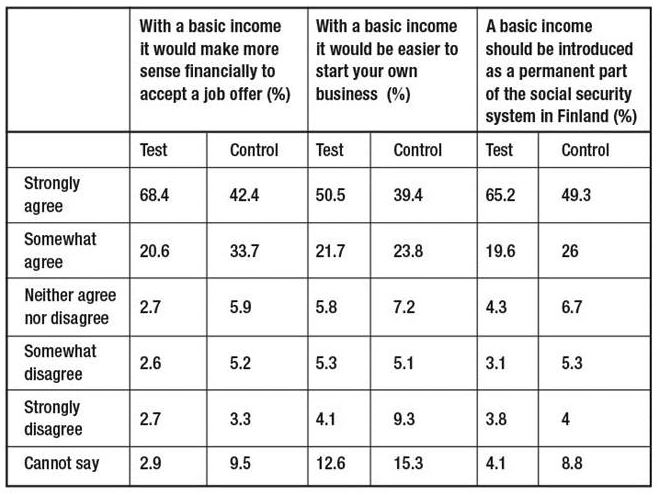The overlooked findings from Finland's "basic income" experiment
The first set of preliminary results have been released from Finland’s so-called Basic Income experiment.
We say “so-called” because while the payments bore some of the hallmarks of Basic Income, the experiment was far from perfect in many respects, as it targeted only unemployed people rather than the general population, and the stated aim of the programme was to test the employment effects of making social welfare payments unconditional on labour market status, rather than a more holistic analysis.
Scanning the headlines in the days following the release, a pattern seems to have emerged in the narrative: “Basic Income has no positive effect employment take-up”. The reality is somewhat more nuanced.
Over the course of this experiment, the Finnish government gave 2,000 unemployed people a payment of €560 per month. This was not particularly revolutionary, as it amounts to the usual social welfare payment for jobseekers in Finland. What was revolutionary was the idea that it was not conditional on employment status: If the recipient took up a job they could still keep their monthly welfare payment, and they would not have it withdrawn on account of failing to engage with labour market activation or other such programmes. The idea was to see if giving the payment based on these conditions would make people more likely to take up employment. The logic is this: If a welfare recipient gets a job, they lose their welfare and this fact may incentivise them to remain unemployed. But if they don’t have to worry about this, unemployed people will be more likely to go seek work.
Reporting of the preliminary results from the experiment suggest this is not the case as participants in the experiment were no more or less likely to get jobs than other unemployed people for whom the usual conditions were attached to the payment. (There was a large control group for comparison). Cue a lot of shoulder-shrugging and a conclusion that “basic income has failed”.
Such assessments are missing a couple of key points. The first is that the long-running idea that if governments gave people free and unconditional money they wouldn’t bother to work has been knocked more than a little by these results. The Finnish government gave unconditional money to a particular group of unemployed people, and found they were no less likely to get jobs than other unemployed people.**
True, they were no more likely to, at least in the first half the experiment – the results from the second year are still to be analysed – but it does indicate that perhaps people aren't unemployed because they're lazy or unmotivated. Perhaps they're unemployed because there aren't enough jobs to go around. For example, the McKinsey Global Institute has reported that automation could destroy up to 800 million jobs around the world by 2030. This will lead to many employment opportunities disappearing, regardless of how welfare systems purport to motivate recipients.
Another key point that is being missed is that the results show that those participants in the experiment who received their unconditional payment were happier, healthier, and less stressed than their counterparts, while also being no less likely to contribute to society. Confidence levels in the test group were also better than in the control group, as was self-perceived assessment of good health - 54.8 per cent at good or very good, versus 46.2 per cent in the control group.
The table below illustrates how the experiment participants had a broadly very positive attitude towards the idea of a Basic Income-type payment, and that they felt it was beneficial.
**Interestingly, of those in the test group who found part-time work, 69 per cent said they would rather full-time work, while 58 per cent of the control group in part-time work expressed the same preference for more working hours. This difference in preference could not be explained by the survey which, it must be noted, has quite a small sample size of respondents for this question.
Interested in more information on Basic Income?
Videos of each presentation, as well as a free download of the papers, are available here